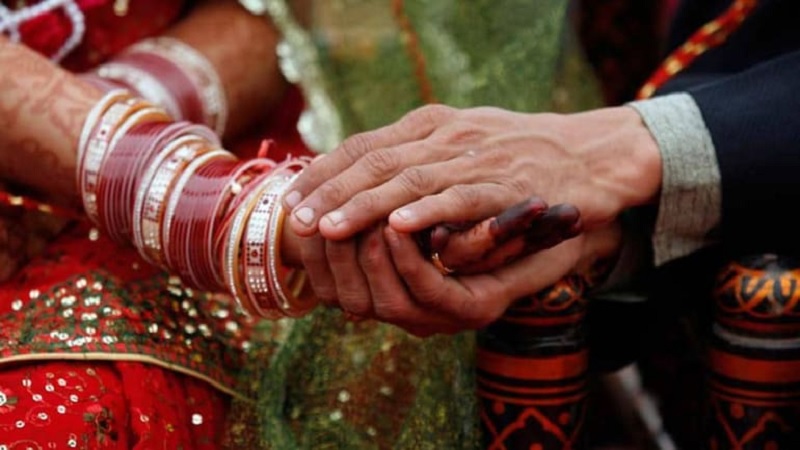 Image Courtesy:indiatoday.in
Image Courtesy:indiatoday.in
The Gujarat government has told the Gujarat High Court on August 17 that interfaith marriage is not prohibited under the Gujarat Freedom of Religion (Amendment) Act, 2021, but using it as a tool or instrument for effecting forceful conversion is not allowed. The bench of Chief Justice Vikram Nath and Justice Biren Vaishnav is hearing petitions challenging the amending Act. The matter will next be heard on August 19.
The original Act of 2003 prohibited conversion by force or allurement, however the 2021 amendment make conversion by marriage an offence which is one of the many common threads between the anti-conversion laws passed by UP, Uttarakhand, Himachal Pradesh and Madhya Pradesh as well.
Advocate General Kamal Trivedi appearing for the state quoted the statement of objects and reasons that ‘it is considered necessary to prohibit the forcible conversion by marriage’ and stated that the word “marriage” in section 3 takes its colour from the company of the words around it. Thus, as per his interpretation, the context of marriage comes only if there is “force, allurement or by any fraudulent means”.
Section 3 of the amendment Act states, “no person shall convert or attempt to convert, either directly or otherwise, any person from one religion to another by use of force or by allurement or by any fraudulent means or by marriage or by getting a person married or by aiding a person to get married nor shall any person abet such conversion”.
A plain reading of this provision suggests that each means mentioned here i.e., force, allurement, fraudulent means, marriage are all independent of each other due to the use of the word “or” after each of these words.
The bench implored Trivedi that if he wants to make a statement on how the provision must be read, they will record the same. “But say that this (section 3) has to be read like this (in conjunction with the three elements of force, fraudulent means or/and allurement),” the bench said, to which Trivedi responded that he can take instructions and provide the same in writing, reported Indian Express.
At the previous hearing held on August 5, the high court had issued notice to the state government and the bench had orally expressed its displeasure over the changes brought about in the law. The bench had orally remarked, “Either you say if there is marriage by force or fraudulent means and then there is conversion, then of course, it is not right, fair enough. But if you say only because of marriage, someone converts and so it is an offence (it is not correct).”
The bench had opined that if an inter-religious marriage is without coercion or fraudulent means then it should not be treated as an offence. When state counsel Manisha Luvkumar contended that the object of the Act is to check that if in a relationship if one says unless you convert, there will be no marriage. To this, CJ Vikram Nath, reported responded that “it is between the two individuals”. This clearly indicated that the bench was keen on drawing a line on State interference in an individual’s privacy. Further, when the state counsel said that marriage does not require conversion, the court remarked that it is for the married couple to decide which religion they want to follow
SabrangIndia’s sister organisation, Citizens for Justice and Peace (CJP) has also moved the Supreme Court against the anti-conversion laws passed by UP, Uttarakhand, Himachal Pradesh and Madhya Pradesh. The petition cites detailed grounds for this challenge including issues of privacy, extra-Constitutional powers to police and non-state actors, the fact that they violate the non-negotiable tenets of secularism, equality and non-discrimination. Both, the Act and Ordinance, are inherently anti-women and discriminate against women, giving them no agency whatsoever and are therefore bad in law and substance.
In April, the Supreme Court made a passing remark on the right of an individual to choose his religion. While dealing with a plea against black magic, superstition and mass religious conversions, the court said, “I don’t see a reason as to why any person above 18 cannot choose his religion. There is a reason why the word “propagate” is there in the Constitution”.
Related:
Gujarat Freedom of Religion Act challenged, HC issues notice
Allahabad HC grants bail to man charged under anti-conversion law
Woman embraces Islam and marries a Muslim, Jammu & Kashmir HC grants protection